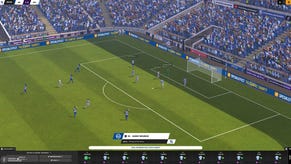Football Manager 2024 review - technical tweaks make for outsized improvements
Theory of managerial gains.
It's rare to notice a new Football Manager's tweaks as quickly as I did with FM24. It's March 2025, two-and-a-half seasons into my traditional Manchester United rescue job, and deep into a four-way title race between us, City, Chelsea, and Liverpool. First game of my freshly-imported save from FM23 - and so first game in FM24 - and it's City away. A potential early title decider at the Temple of Doom. In a charitably patient mood I have a quick tinker with my freshly reset set pieces - least I could do, given they've reworked the system, I tell myself graciously - but faced with several pages of UI within UI, executive dysfunction wins out and I give up for now to just get to the game. How much difference could it make in one match?
Four goals difference is how much, reader. City score three in 35 minutes followed by a fourth in the second half, every single one from a set piece (header from free kick, header from corner, penalty, header from another free kick) and despite a roughly similar xG of 2.93 to 2.34, I lose four-nil.
It's important to note that what happened next was done purely for the sake of science. I reloaded the save - scientifically - and then worked through every single set piece, meticulously, and then delivered a supreme 0-0 hammering, City scraping together an xG of 1.19 from six corners and twelve free kicks, to our 2.56 (missed penalty: Bruno Fernandes. I don't want to talk about it.) Which of those two branching timelines continued on as my main save will remain confidential, but put it this way: setting up set-pieces in FM24 takes just as long as it did in FM23, and I have no inclination to do it more than once.
The set-piece setup slog will be familiar to most FM players, and really it's not the only one of its kind in the series. Each in-game year for me involves a series of real-world hours dedicated to renewing staff contracts and youth contracts. Each new save means hiring and firing a load of new coaching staff, setting up dozens of scouting assignments - Manchester United start with a comically bloated scouting department of over 40 people - and each month then sifting through sometimes close to a hundred reports at a time, even with some fairly stringent filters on what makes its way to my desk.
All of these, of course, can be delegated, and whether or not you do will come down to your tolerance for missing marginal - or sometimes quite a bit more than marginal - gains for the sake of a less admin-heavy experience. But set pieces remain the feature that's emblematic of FM's difficulty with juggling admin and action, with the overhaul a clear attempt to make things a little less painful.
There's mixed success to this one. The upside is, as I discovered against my noisy neighbours and indeed in many more successful outings since, taking the time can make a real, direct impact to your matchday results. It's easier to set up a variety of deliveries, with the option to dictate - roughly - how often each routine is used an especially nice touch, along with the new Set Piece Coach introduced this year and the knock-on tweaks to training (previously there were multiple set piece-related training sessions that it was never possible to fit in alongside actual training; bundling them into just one set piece session and one for penalties, useful for big knockout game preparation, makes far more sense and I've used them far more often.)
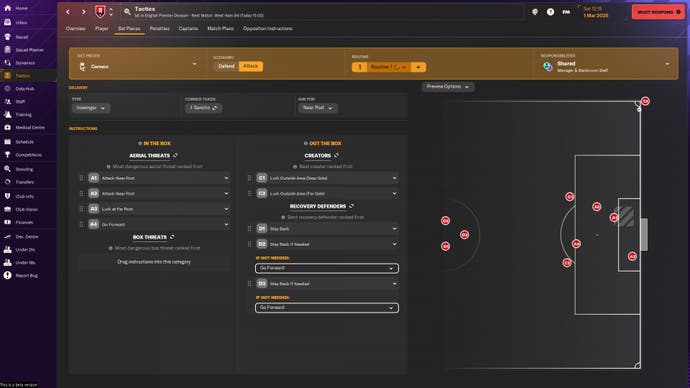
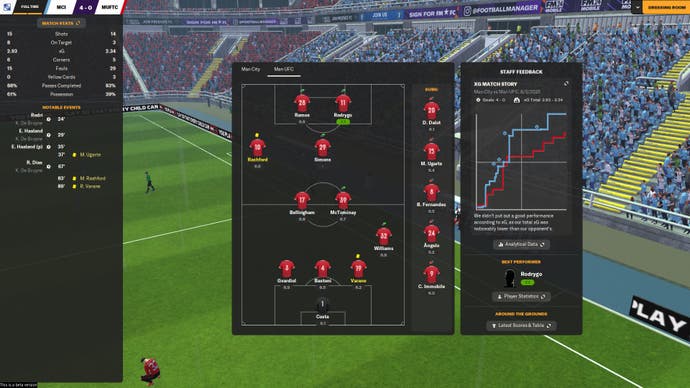
Some of the same downsides remain, however, along with one or two new ones. If you do opt to manually set them up over handing them to your set piece coach - which I would still recommend if you really care about winning - it's still as time-consuming as ever. You still can't program in more elaborate routines beyond simply dictating who stands where and where the initial delivery goes, like say intentional dummy runs, flick ons, or multi-step routines involving a specific pass between a couple of players after the ball's first played in from the set piece taker. It's understandable - this would likely take a huge amount of work behind the scenes, as well as even more time for the manager to set them up - but without it, FM24's set pieces are never really going to feel like real life ones.
More simply and to me, much more annoyingly is an issue with choosing set piece takers in this reworked version. Rather than a simple list of players for each side, say when setting up routines for attacking corners, you first choose whether you want the set pieces to be an inswinger or an outswinger, and that's tied to the routine for both sides which, so far, I can't spot a way to untangle. The issue is, the direction of the ball's swing is of course dictated by which foot the taker is using - an inswinger from the right hand side requires a left-footed taker - and most teams are made up of roughly eight or nine right-footed players, and one or two left-footers. And one of those left-footers is probably a defender.
The end result: on multiple occasions left-footed Andrea Bastoni, a six-foot-four centre-back with a Corners rating of four (out of 20), and my team's best header of the ball, has been taking my right-sided corners for me despite being bottom of the list of takers and me having an excellent right-footed taker in the side. As with many things in Football Manager, there's a not insignificant chance there's a way to solve this within the game that just hasn't made itself clear to me yet - in which case, mea culpa, but then the game needs to explain itself far better, as I play this Manchester United misery simulator for a good 300 hours a year, and reckon I know my way around it. The simple solution would be allowing me to adjust preference for inswingers or outswingers separately according to the side, or just to let the list of preferred takers dictate the swing, rather than the other way round.
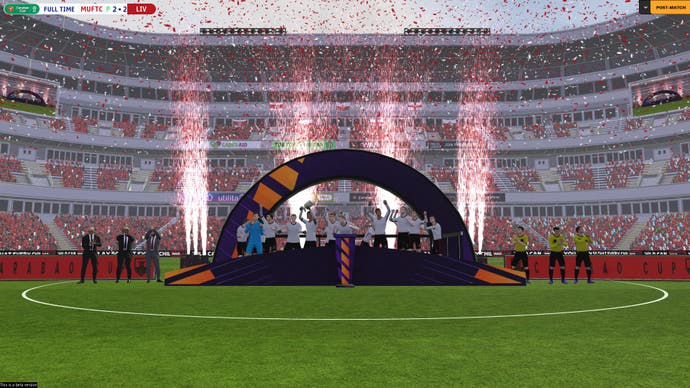
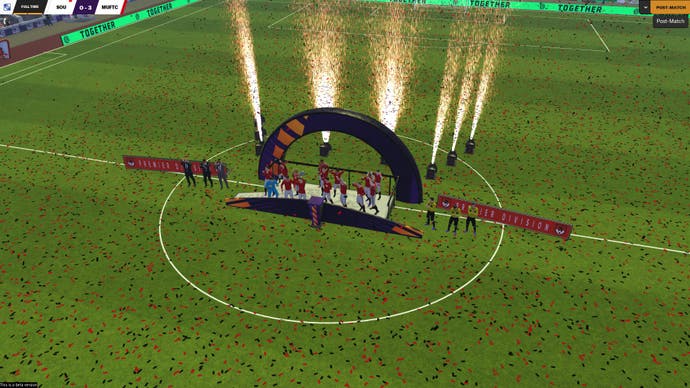
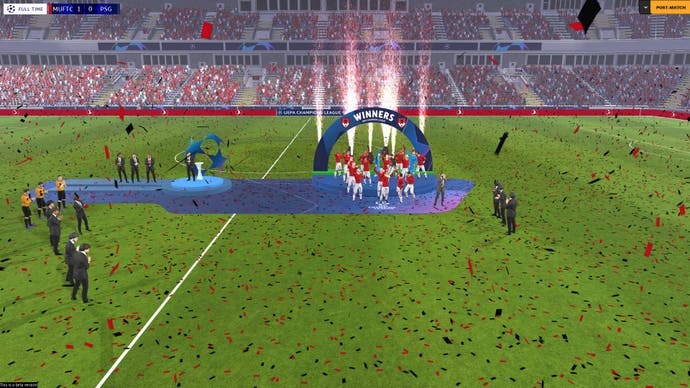
Regardless, the new set pieces are, as a whole, marginally better than they were in previous Football Managers and will benefit hands-off players with another feature they can opt to delegate. Plus, all that detail and this is just one feature. FM24, despite being something of an iterative year before the promised revolution of FM25, has a range of tweaks like this.
One of the biggest and most enjoyable - if slightly whacky - ones is the dramatic shift in the balance of power brought by FM24's transfers rework. The change is in the selling. Previously, it was very hard to shift a player that you weren't happy to burn all bridges with and utterly infuriate by repeatedly, manually, and somewhat bluntly offering them around to all other clubs - or specific ones via a very fiddly sub-menu. Now, you can talk to their agents about generating some offers for you, with three tiers of urgency within that (exploring the idea of a sale, keen to sell, desperate to get rid) dictating the likelihood of an offer and, inversely, how much you're likely to get (more for casually exploring a sale; less, but more reliably, if you're desperate.) Beyond that though, there's also the option to hire an "intermediary", one of those shady, parasitic entities you hear about during football's midsummer silly season and who probably spend much of their waking lives on the phone to Fabrizio Romano. These mysterious figures will then pop up as a choice - say between one who promises a slightly lower offer but faster, or a slightly higher offer with a few more days' wait - but this option's a bit more permanent, and likely to annoy your player, while the agent route has in my experience rarely so much as ruffled a feather.
Finally, there's the old school option which works the same, but is this time re-labelled as "offer via TransferRoom", the in-game version of the real-world app that's sparked much attention for its role as a kind of speed-dater for desperate clubs and floggable, or wantaway players. This functions exactly the same as the old "offer to clubs" option, but the TransferRoom licensing just adds a nice touch of realism.

The real impact here, though, is the genuine livening-up of the transfer window. Where previously you were forced into being somewhat passive, waiting for offers and allowing that to dictate whether you can then go for an upgrade, now you can test the waters to see what you might be able to get - in crass terms, it's a welcome laxative for what was a somewhat constipated system. The market feels alive, with bids flying all over the place and transfer budgets significantly more fluid. There are some outlandish results in places, mind, exacerbated by the almost limitless new money of the Saudi Pro League. In the summer of 2025 I sold a 30-year old Milan Škriniar, initially signed on a free transfer and now with two years left on his contract and a market value of about £50-55m, for £145m to Saudi club Al-Hilal. A nearly 33-year-old Raphaël Varane, with just a year left on his contract, went to Al-Ittihad for £107m, with both players landing monstrous, £800,000-plus per-week contracts. Even those transfers at the silly end of things aside, the takeaway here is that you will now actually be able to manoeuvre in the transfer market, it'll feel much more like the dramatic, outlandish circus that is the real thing, and it's much more fun.
There are also some knock-on effects on related features, with small tweaks working nicely into the new agents system. You can now set players targets in private conversations - so instead of constantly yelling at that one slack trainer, you can actually give them something tangible to work towards, with consequences; or you can set target-related promises during things like contract negotiations, where players will get their promised increase of game time if they achieve a certain average match rating, say, or get a certain number of clean sheets, goals or assists. Developer Sports Interactive also claims to have made "extensive" changes behind the scenes to how players react during conversations, with fewer of those much-memed tantrums when you try to offer someone a harmless compliment on scoring an international goal (although I never had many of those anyway - you lot really should look more closely at player's personalities when you sign them, especially the comically confrontational newgens.)
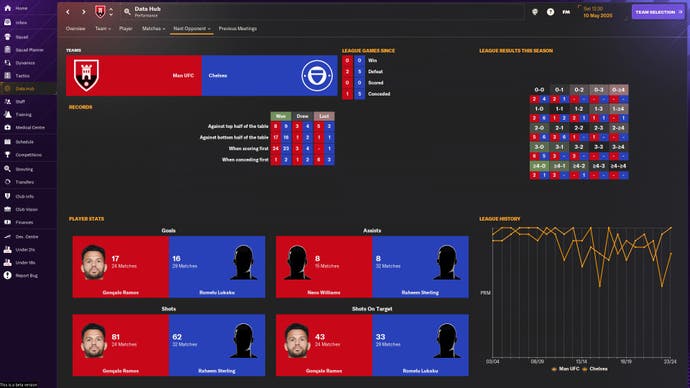
Other little tweaks include improvements to the Squad Planner, with it now featuring some more detail like player position maps and preferred roles and some staff suggestions for how to plug gaps - plus its integration into international management, and the national pool getting some simple list view improvements like player potential ratings. The in-game engine is also upgraded again, with to my eyes one of the most noticeable improvements, visually speaking, since it was introduced. Animations are vastly more lifelike and the football significantly more fluid, while I've personally noticed a bit less of the "ball over the top" syndrome that dominated FM23, where fast strikers and Route One seemed to almost always be the most effective.
There are also some lovely tactical improvements for fellow whiteboard nerds, with Pep Guardiola once again providing the inspiration - as he typically does, I will begrudgingly admit, here in the real world. The Inverted Wing-Back (IWB) role, popularised by Guardiola with Joshua Kimmich at Bayern Munich and then Joao Cancelo and various other left backs at CIty, remains an option, but now there's the complimentary Inverted Full Back (IFB) role, newly introduced here in FM24, that's arguably always been necessary to make that IWB work.
The brief summary is, IWBs will still move into the midfield "pivot" looking to pick up the ball from centre-backs like a typical midfield playmaker, but now the IFB can move across more centrally, instead of staying out wide and pushing on up the wing like a typical full back, acting instead as though it's a central defender with the Wide Centre Back role. In other words, it lets you play how City, and a number of other clubs last season, liked to play when they're building up from the back, with three across the back and two in midfield. Sports Interactive puts this down to their work on introducing "positional play" to the match engine - briefly, the idea that players think about always occupying physical places on the pitch, rotating to fill gaps left by others, rather than always staying in their starting position.
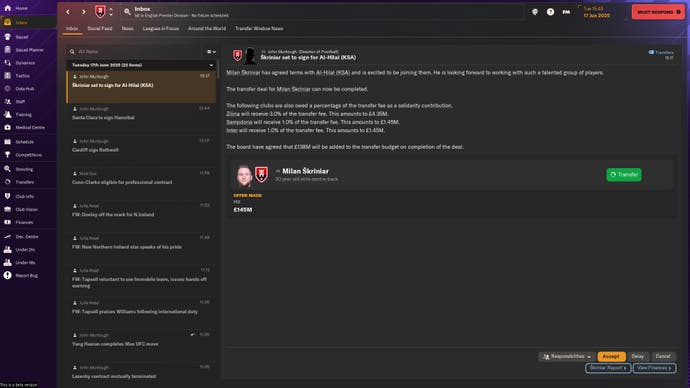
It's a lovely addition, and one I've personally been after for a while. Typically, the real world game has moved on just as the in-game one has tried to catch up. Now Manchester City move a centre-back into midfield in John Stones, who seems to have created yet another entirely new role on the pitch, rather than their full back, but that's an issue Football Manager will always wrestle with. I'm still hoping for a more fundamental rework of pressing triggers, for instance, with FM25 hopefully being the place for that - the current system of just basing it on a player or position is outdated by a few years now, with real-world pressing triggers typically something more like "trigger the press when an opposition passes backwards", or when an opposition has a heavy touch, or even controls it with a certain foot.
In an ideal world, there's also a lot of room for improving how, tactically, the game handles in and out of possession "phases", as analytics wonks like to call them. Roberto De Zerbi, Brighton and Hove Albion's manager, has revolutionised this in the real world with his sides baiting the press, but even before that there's been a marked shift in how teams play, effectively with two formations at all times. Manchester United often have a 4-2-3-1 on the team sheet, press as a 4-3-3, and move into something more like a 3-2-4-1 in settled possession. Where FM24 deserves some significant credit is in how it gets remarkably close to this in the in-possession side of things at least, especially with the introduction of positional play and wide defender roles. More intricate pressing is just the other half that's still waiting for its turn.
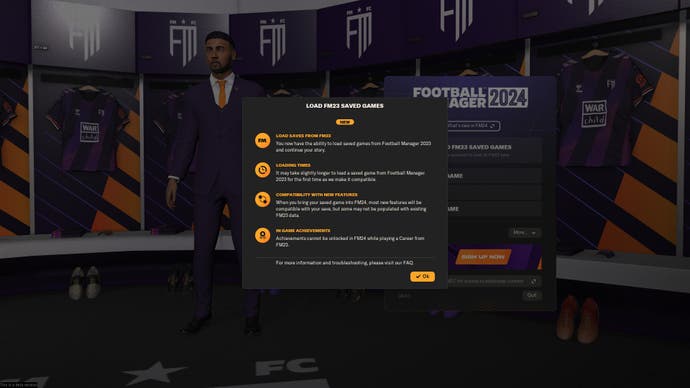
There are other little items on the wishlist, which Sports Interactive gradually ticks off each year but hasn't quite got to yet. Non-penalty expected goals is much more useful than just standard xG, for instance, and could do with an addition. There's also, at least to my eyes, no discernable way to find the list of how all players in a given league rank according to data. An example: an analyst report might tell you a player is 3rd in the league for successful headers won. That's handy, but it also immediately makes me want to know who's 1st and 2nd, which as far as I know still can't be found (another mea culpa-but-also-improve-your-UI-please moment if I'm wrong.) There's some weirdness with FFP I've found - throughout the season it will change almost weekly, from passing with a projected profit of £300-odd million to failing at the last minute, as I catastrophically did one season by just a few million pounds (a few more save-scumming "experiments" and it turned out my board was renewing a sponsorship deal for £0, but then one time miraculously signed a proper one and all was fine). There's no proper breakdown of how exactly that's calculated and why it seems to so wildly fluctuate so often, suggesting it's likely a bit of a mathematical quirk of something going on behind the scenes - or perhaps a bug with how it handles those sponsorships.
But these are nothing major, and all of this is putting aside a small change of truly gigantic impact that I have adored this year: the ability to port your saves from previous editions of Football Manager to the next. Loading up my FM23 save with United, with thoroughly unfinished business against long-time rivals, and all kinds of dangling narrative threads, has been an absolute delight. It'll likely extend my saves dramatically, which usually last three to five seasons as I crawl my way through my many thousands of micromanagement decisions. It reserves that "new save" moment for when you feel ready to start afresh on your own terms - maybe after the winter update that arrives each February or March - instead of when the new game arrives.
The overarching effect with FM24 then is actually to shift Football Manager towards something closer to an annual subscription, only one you can still own, that never goes offline, and that you can still opt out of paying for, if you'd rather shirk the new edition to stick stubbornly to your "classic server" FM like a World of Warcraft player who wishes it were still 2009. It's a best-of-both-worlds scenario, and with granular but hugely impactful tweaks this year, FM24 is undoubtedly the best iteration of Football Manager in its current form. Plus, it gives me a couple hundred more hours before I've got to set up any more corner routines again. So really it's priceless.
A copy of Football Manager 2024 was provided for review by Sega.
.png?width=690&quality=75&format=jpg&auto=webp)





